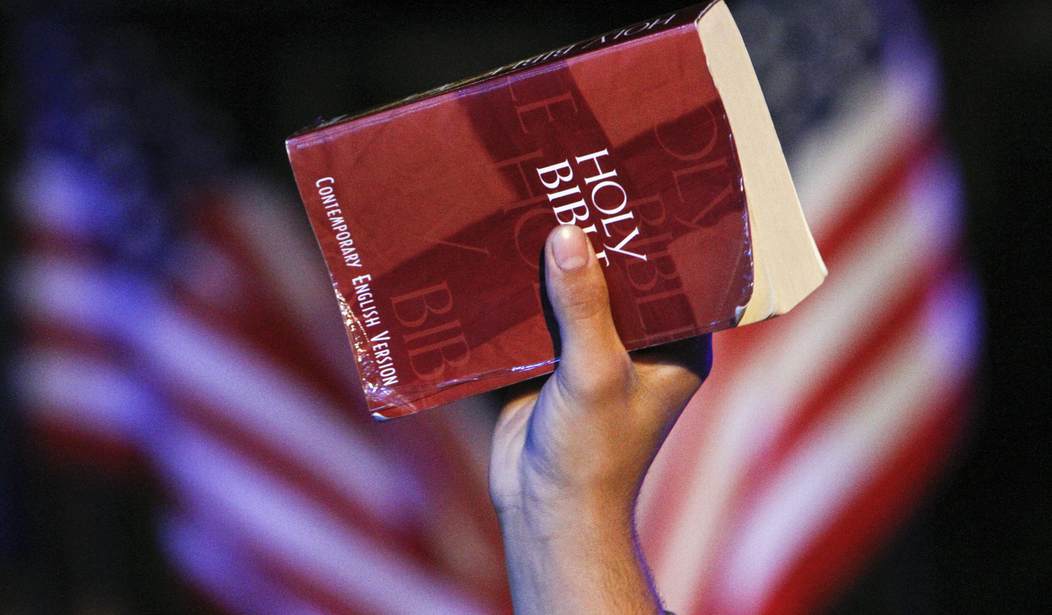Gen Z is surprising in many ways. Generational prejudices have us looking at it in many negative ways, and, to be sure, some of it is well-deserved, but there are some serious positives.
In a previous article, I discussed how Gen Z almost seems to be dividing off into two separate generations within one, with the older Gen Z crowd leaning further left by six points while the younger Gen Z crowd leans right by 12. Moreover, the ideological split is largely gender-based. Gen Z men tend to lean conservative by a large degree, while Gen Z women keep to the left.
READ MORE: Gen Z Is Splitting Apart at the Ideological Seams)
But as it turns out, Gen Z is also increasingly Christian.
As reported by Newsweek, the uptick in believers isn't small:
In the U.S., rising numbers of young people have also been turning to Christianity. A recent study by Barna also found that "rates of belief in Jesus" have increased, with much of this increase being down to a newfound interest in Christianity among Gen Z.
Barna's latest data showed that 66 percent of all U.S. adults surveyed have "made a personal commitment to Jesus." That marks a 12 percent increase since commitment levels were polled in 2021. Pew Research Center also released a report in February showing that the declining rates of Christians that had been tracked for years have begun to taper off and stabilize.
It's not isolated to the United States, either. The Independent also reported that Gen Z in the U.K. is experiencing a similar rise:
The number of people reporting monthly attendance has risen from 8 per cent in 2018 to 12 per cent in 2024. But the most remarkable jump in reported attendance has been among Generation Z, quadrupling from 4 per cent to 16 per cent of 18- to 24-year-olds. There’s been an even more dramatic shift for young men: a fivefold growth from 4 to 21 per cent.
[...]
There are other markers, too, that indicate a potential reversal of fortunes for the Christian faith. According to Nielsen BookScan data, UK Bible sales went from netting £2.69m in 2019 to £5.02m in 2024 – an increase of £2.33m in just five years. To put this in context, Bible sales increased by just over £277,000 in total in the 11 years from 2008 to 2019. This renewed interest in scripture is also being attributed to Gen Z; the Good News Bible – The Youth Edition, for example, has seen sales nearly double since 2021. And it’s not a UK-only phenomenon: US Bible sales have seen a 22 per cent uplift in the past year alone, with publishers reporting more first-time buyers than ever.
What's driving the push? It's likely a mix of factors.
For one, men particularly find Christianity attractive, as it values masculinity and the role of a man. In a modern society where men are denigrated, cast aside, or often hated just for simply being men, Christianity tells men they're welcome and valued. This may also coincide with the rise of traditionalism in many youth circles, with traditional roles of men and women being embraced by both sexes.
There seems to be a rejection of forced modernity as well.
As reported by the New York Post, Gen Z's Christianity is far more orthodox than many churches are willing to be:
A survey of Orthodox churches around the country found that parishes saw a 78% increase in converts in 2022, compared with pre-pandemic levels in 2019. And while historically men and women converted in equal numbers, vastly more men have joined the church since 2020.
Father Josiah Trenham has led Saint Andrew’s Orthodox Church in Riverside, California, for nearly three decades — and he’s noticed a swift jump in interest: “The last four to five years have been a massive uptick. It’s showing no sign of tapering off. If anything, it’s increasing still … It’s happening massively in untold numbers all over the country.”
According to Trenham, there has been a "feminization" of modern church services, including "emotional songs, swaying, uplifted hands, and eyes closed in ecstasy."
“Men are much less comfortable [in those settings], and they have voted with their feet, which is why they’re minorities in these forms of worship,” he said. “Our worship forms are very traditional and very masculine.”
Indeed, the drive to traditionalism is mainly driven by men, and men seem to be leading the Christian revival.
And it's definitely not surprising. We do live in something of an unstable age where everything is subject to change, including those things that are supposed to be static. This also means the church, which has morphed into something more akin to concerts with charismatic pastors at the helm. In some cases, it's even been infiltrated and influenced by the LGBT community.
Men gravitating toward traditionalism isn't a surprise at all, and it will be interesting to see what comes of it.














